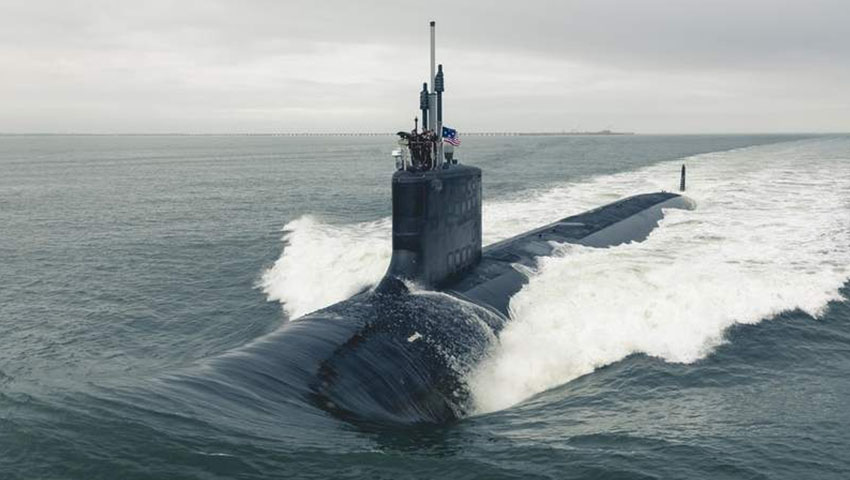Cost and schedule risks linked to the construction of Block V Virginia Class submarines have been detailed in a newly published report.
To continue reading the rest of this article, please log in.
Create free account to get unlimited news articles and more!
A new Congressional Research Services report has flagged issues relating to the United States Navy’s Virginia Class Attack submarine procurement program, which include the force-level goal and procurement rate, industrial-base challenges, and cost and schedule risks.
The report has noted a total of 36 Virginia Class submarines have been procured by the US Navy since the program commenced in 1998, at a rate of approximately two platforms per year.
However, the review references findings from a Government Accountability Office (GAO) report published last month, which noted delays in the construction of Block V Virginia Class submarines.
“Over the past year, work on Block V submarines fell further behind schedule and construction costs continued to grow above original targets due to overall higher workforce demand and additional factors such as correspondingly less experienced workers,” the GAO observed.
According to the Congressional report, these workforce constraints could be attributed to the simultaneous construction of Columbia Class ballistic missile submarines.
“The Navy’s prioritisation of the Columbia Class submarine relative to the Virginia Class submarine exacerbated the effect of these workforce trends for Virginia Class construction,” the report noted.
“The same companies build both submarine classes and have been challenged to meet both programs’ increasing workforce needs.
“Program officials reported that the shipbuilders added more workers to the Columbia Class construction efforts than the Virginia Class, contributing to delays on the Virginia Class submarines.”
As a result, program officials reportedly expect the first three Block V submarines to be delivered behind schedule, with additional cost increases and schedule delays “likely”.
The Pentagon currently estimates each Block V Virginia Class vessel, equipped with the Virginia Payload Module (VPM), would cost an estimated US$3.6 billion (AU$5.2 billion).
“The Navy’s current cost and schedule projections may be optimistic because they assume a significant amount of improvement in construction efficiency that has yet to be achieved, and the Columbia Class’ growing staffing needs continue to add risk for the Virginia Class,” the report adds.
These findings come amid concern regarding the delivery timeline for Australia’s future fleet of nuclear-powered submarines, promised under the AUKUS agreement.
Along with the UK’s Astute Class Vessel, the Virginia Class submarine is being considered for selection by the Commonwealth government’s Nuclear Submarine Taskforce.
The Congressional report casts doubt over former defence minister and federal leader of the opposition Peter Dutton’s recent call for off-the-shelf purchases of two Virginia Class submarines before 2030, ahead of the local construction of a subsequent eight vessels.
Deputy Prime Minister and Minister for Defence Richard Marles has dismissed the suggestion, conceding delivery of a nuclear-powered submarine to the Royal Australian Navy before 2030 was “extremely optimistic”.
A government decision on a future RAN SSN platform is expected in March next year.
[Related: The nuclear submarine builders must be consulted by the task force ]
Charbel Kadib
News Editor – Defence and Security, Momentum Media
Prior to joining the defence and aerospace team in 2020, Charbel was news editor of The Adviser and Mortgage Business, where he covered developments in the banking and financial services sector for three years. Charbel has a keen interest in geopolitics and international relations, graduating from the University of Notre Dame with a double major in politics and journalism. Charbel has also completed internships with The Australian Department of Communications and the Arts and public relations agency Fifty Acres.

 Login
Login








